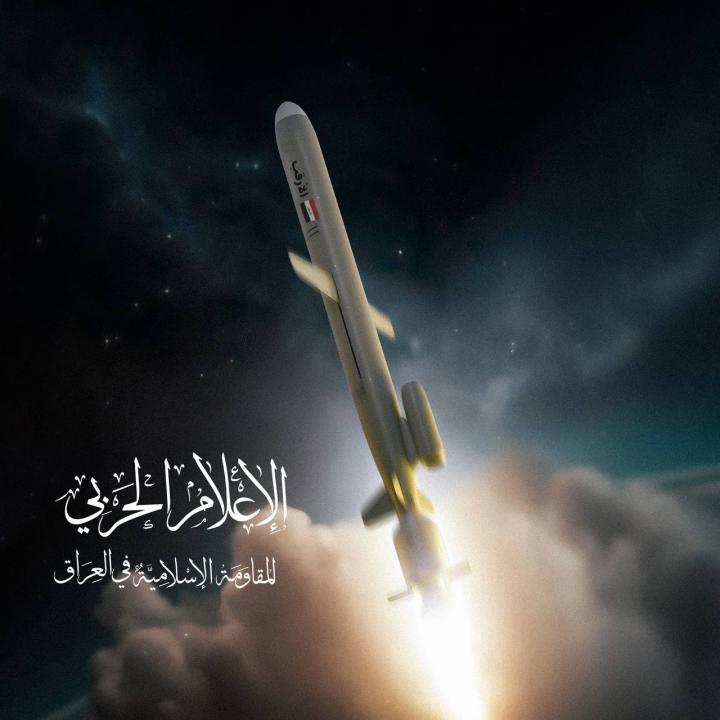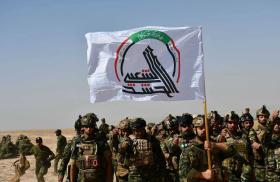
Can Iraq's Militias Imitate Houthi Successes at Sea?

The senior terrorist figure Abu Ala al-Walai is seemingly answering Iran's call for a maritime blockade on Israel, but is this a real threat or just a desperate effort to claim strategic influence before the Gaza war ends?
On January 24, Abu Ala al-Walai (real name Hashim Bunyan al-Siraji), the leader of the U.S.-designated militia Kataib Sayyid al-Shuhada (KSS), posted a statement announcing the start of the second phase of Iraqi muqawama (resistance) operations in solidarity with the Hamas war. According to him, "[This phase] will include enforcing the blockade on Zionist maritime navigation in the Mediterranean Sea and render the [Israeli] entity’s ports out of service...This will continue until the unjust siege on Gaza is lifted and the horrific Zionist massacres against its people are stopped” (Figure 1).
The statement signals that Iraqi militias have begun targeting what they perceive as Israeli-linked ships and ports in the Mediterranean. A few hours before Walai's announcement, the Islamic Resistance in Iraq (IRI) umbrella brand claimed responsibility for a drone attack against the port of Ashdod (Figure 2).
This was not IRI's first maritime claim—on December 22, for example, it claimed responsibility for an attack with unspecified weapons against “a critical target on the Mediterranean Sea.” Yet Walai seems to be signaling a more intense campaign targeting Israeli-linked Mediterranean assets, purportedly using long-range cruise missiles or drones launched from Iraq or Syria.
Answering Khamenei's Call
The latest developments unfolded immediately after Iranian Supreme Leader Ali Khamenei called for “cutting the vital lifeline of the Zionist regime” during a January 23 speech to “the organizers of the National Congress for the Commemoration of the 24,000 Martyrs from Tehran Province” (Figure 3). Khamenei made a similar call during a November 1 speech to Iranian students, asking “Muslim governments” to “block oil exports to the Zionist regime and stop economic cooperation with that regime (Figure 4).
One day after that November speech, Yemen's Houthi movement and other members of the self-styled "axis of resistance" started a campaign to boycott American and Israeli products (Figure 5). And on November 19, the Houthis announced that they would begin targeting any Israeli-linked ships sailing the Red Sea.
The "Resistance" Endgame in the Gaza War
Since the war erupted, the Houthis have significantly outperformed the Iraqi muqawama in terms of taking serious kinetic actions that globalize the Gaza situation and amplify international pressure to end Israel's military campaign. Accordingly, Iraqi militias may have felt they needed to manufacture a "strategic" contribution to the crisis, whether by pushing a significant-sounding change to the U.S. force posture in Iraq or by publicizing visible evidence that they have affected Israel's calculus in any meaningful sense, which is not the case so far.
Time may be running out to demonstrate this impact before the anticipated end of major ground operations in Gaza. The Iraqi muqawama and the rest of the "axis" can therefore be expected to increase their posturing in the hope of proving they had some hand in halting Israel's campaign. This could include accelerated strikes against Israel by Iraqi fasail (armed groups), with the specific intent of ushering the Gaza campaign out with a bang.
They might also try to goad the United States into conducting more strikes inside Iraq. The militia Kataib Hezbollah has already been prodding Washington with new strikes against al-Asad Air Base in recent days, seemingly trying to up the stakes after U.S. forces did not respond immediately to a major January 20 ballistic missile salvo. Ironically, the group may be hoping for intensified U.S. strikes on muqawama leaders in central Baghdad, since that may be the only way of pushing the Iraqi government into formally requesting a change of status in the U.S. military presence. Yet Washington wants to control the terms of any withdrawal debate and may not give the militias a clear excuse to attempt new parliamentary action.









